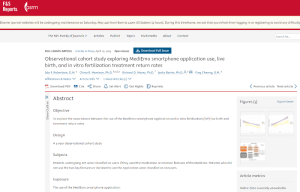Fertility app linked to higher IVF success and patient return rates, study finds
2 June 2025
A new study has found that using MediEmo, a fertility-focused smartphone app, may improve key outcomes for patients undergoing IVF treatment.
MediEmo is an evidence-based mobile app designed to support emotional wellbeing and medication adherence during fertility treatment. Researchers from NIHR ARC West, the NIHR Health Protection Research Unit in Evaluation and Behavioural Science and the Universities of Bristol, Southampton and Cardiff found that patients who used MediEmo were more likely to have a live birth after their first IVF cycle, and return for further treatment after an unsuccessful cycle, compared to those who did not use the app.
The three-year observational study tracked 1,081 patients undergoing IVF. Of these, 863 used MediEmo, while 218 did not. All the users used the medication management key feature of the app and some also used the emotional tracking feature.
The study found live birth rate after an initial IVF cycle to be higher among app users (28%) compared to non-users (19%). It also found app users to be more likely to return for further IVF treatment after an unsuccessful first cycle. Nearly half (46%) of app users came back for another round within a year, compared to 31% of non-users.
Although the app did not appear to improve live birth rates across all completed IVF cycles, researchers say the findings support the idea that digital tools could make a meaningful difference during what is often an emotionally and physically demanding treatment process.
“The observed association suggests MediEmo could offer real benefits to both patients and clinics,” the authors concluded. They noted, however, that further research, including randomised controlled trials, is needed to confirm the results and better understand how digital support tools can be most effectively used in fertility care.
China Harrison, Research Fellow at the University of Bristol and NIHR ARC West, said:
“Digital tools, including apps, are being increasingly used to support medical treatments. Our study highlights the importance of grounding their development in research and incorporating input from both patients and healthcare professionals. This approach ensures that such tools are practical, scalable, and capable of delivering measurable benefits for patients.”
Paper
